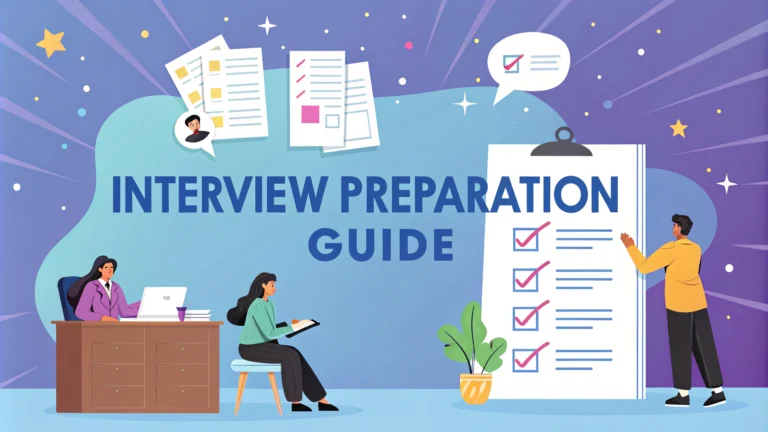Preparing for a penetration testing interview requires understanding both technical skills and professional conduct in security assessment scenarios.
Successful penetration testers combine practical hacking expertise with clear communication abilities to explain complex vulnerabilities to different audiences.
This guide covers key areas to focus on during your interview preparation, including technical concepts, methodology, and real-world testing scenarios.
Technical Knowledge Fundamentals
- Network protocols (TCP/IP, UDP, ICMP)
- Web application security (OWASP Top 10)
- Operating systems (Linux, Windows)
- Scripting languages (Python, Bash, PowerShell)
- Common security tools (Nmap, Burp Suite, Metasploit)
Methodology Questions
Be prepared to explain your penetration testing methodology, from reconnaissance to reporting.
- Information gathering techniques
- Vulnerability assessment approaches
- Exploitation strategies
- Post-exploitation activities
- Documentation and reporting procedures
Practical Scenarios
Practice explaining these common penetration testing scenarios:
- Web application assessment process
- Network infrastructure testing steps
- Mobile application security testing
- Social engineering engagement planning
- Wireless network security assessment
Tools and Technologies
| Category | Essential Tools |
|---|---|
| Reconnaissance | Maltego, Recon-ng, Shodan |
| Scanning | Nmap, Nessus, OpenVAS |
| Web Testing | Burp Suite, OWASP ZAP, Nikto |
| Exploitation | Metasploit, SQLmap, BeEF |
Soft Skills and Professional Conduct
- Clear communication of technical findings
- Project management capabilities
- Client interaction experience
- Documentation and report writing
- Team collaboration approaches
Certifications to Discuss
- OSCP – Offensive Security Certified Professional
- CEH – Certified Ethical Hacker
- GPEN – GIAC Penetration Tester
- CREST – Various penetration testing certifications
Sample Technical Questions
- Explain the difference between stored and reflected XSS
- Describe your approach to privilege escalation in Windows environments
- How would you test for SQL injection vulnerabilities
- What steps would you take to enumerate Active Directory
Resources for Practice
- Hack The Box – Practical penetration testing challenges
- VulnHub – Vulnerable virtual machines for practice
- PortSwigger Web Security Academy – Web application security training
- TryHackMe – Guided learning paths and challenges
Next Steps for Success
Focus on building a personal lab environment for hands-on practice with different tools and techniques.
Document your testing methodology and create a portfolio of your security research or bug bounty findings.
Stay current with security news and maintain active participation in the security community through conferences and online forums.
Interview Preparation Strategies
- Research the company’s security services and focus areas
- Review recent security incidents and industry trends
- Prepare questions about the company’s testing methodology
- Practice common technical challenges and scenarios
- Review your past projects and document key learnings
Legal and Ethical Considerations
- Understanding scope limitations and boundaries
- Knowledge of relevant compliance frameworks
- Proper handling of sensitive data
- Documentation of authorization requirements
- Incident response procedures
Advanced Technical Topics
Cloud Security Testing
- AWS security assessment methodologies
- Azure penetration testing approaches
- Container security evaluation
- Serverless architecture testing
IoT Security Assessment
- Hardware security testing
- Firmware analysis techniques
- Communication protocol assessment
- IoT ecosystem evaluation
Career Development Path
- Identifying specialization areas
- Building professional networks
- Contributing to open-source security tools
- Publishing security research findings
- Mentoring and knowledge sharing
Succeeding as a Security Professional
Maintain continuous learning through practical experience and formal education. Develop a strong ethical framework and professional network within the security community. Focus on both technical excellence and effective communication skills to build a successful career in penetration testing.
Remember that the field of security assessment requires dedication to ongoing skill development and adaptation to emerging threats and technologies. Stay committed to professional growth and maintaining the highest standards of security testing practices.
FAQs
- What certifications should I prioritize for penetration testing?
CompTIA Security+, CEH (Certified Ethical Hacker), OSCP (Offensive Security Certified Professional), and GPEN (GIAC Penetration Tester) are essential certifications. OSCP is particularly valued for its hands-on approach. - What programming languages are crucial for penetration testing?
Python is essential for automation and scripting. Knowledge of Bash scripting, PowerShell, and basic understanding of languages like Ruby (particularly for Metasploit) and JavaScript are important. - What tools should I master for penetration testing interviews?
Proficiency in Nmap, Metasploit, Burp Suite, Wireshark, and Kali Linux tools is crucial. Understanding both commercial and open-source tools demonstrates versatility. - How do I prepare for the practical portion of a penetration testing interview?
Practice on platforms like HackTheBox, TryHackMe, and VulnHub. Document your methodology and be prepared to explain your thought process during exploitation. - What methodology frameworks should I know?
Be familiar with OSSTMM, OWASP Testing Guide, PTES (Penetration Testing Execution Standard), and NIST Special Publication 800-115. - What reporting skills are expected in penetration testing roles?
Strong technical writing abilities for creating detailed reports, ability to explain technical findings to non-technical stakeholders, and experience with report templates and documentation tools. - How should I demonstrate my experience if I’m new to the field?
Showcase personal projects, bug bounty achievements, CTF participation, and documented home lab scenarios. Maintain a portfolio of your findings and methodologies. - What compliance knowledge is important for penetration testing?
Understanding of PCI DSS, HIPAA, GDPR, and ISO 27001 requirements. Knowledge of how penetration testing fits into these compliance frameworks. - What soft skills are crucial for penetration testing roles?
Strong communication skills, ethical judgment, problem-solving abilities, attention to detail, and the ability to work under pressure with strict deadlines. - How do I prepare for questions about incident response?
Understand incident handling procedures, familiarity with MITRE ATT&CK framework, and knowledge of post-exploitation cleanup and documentation.








